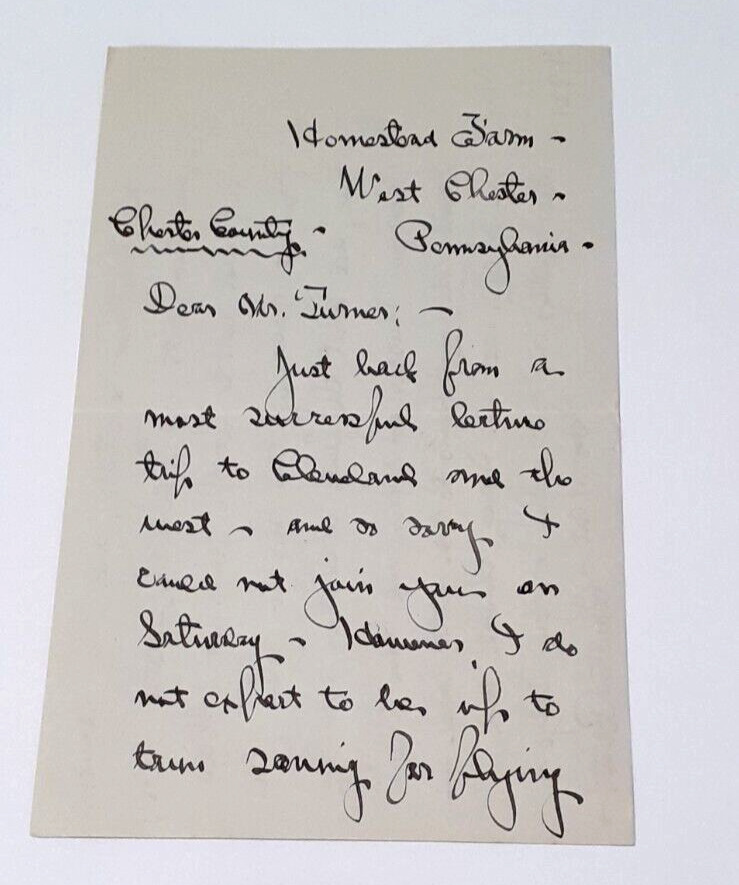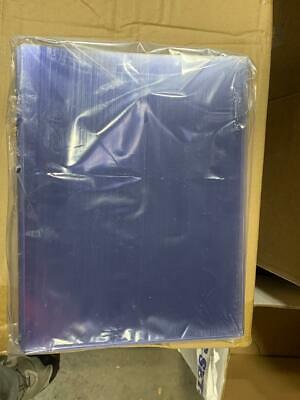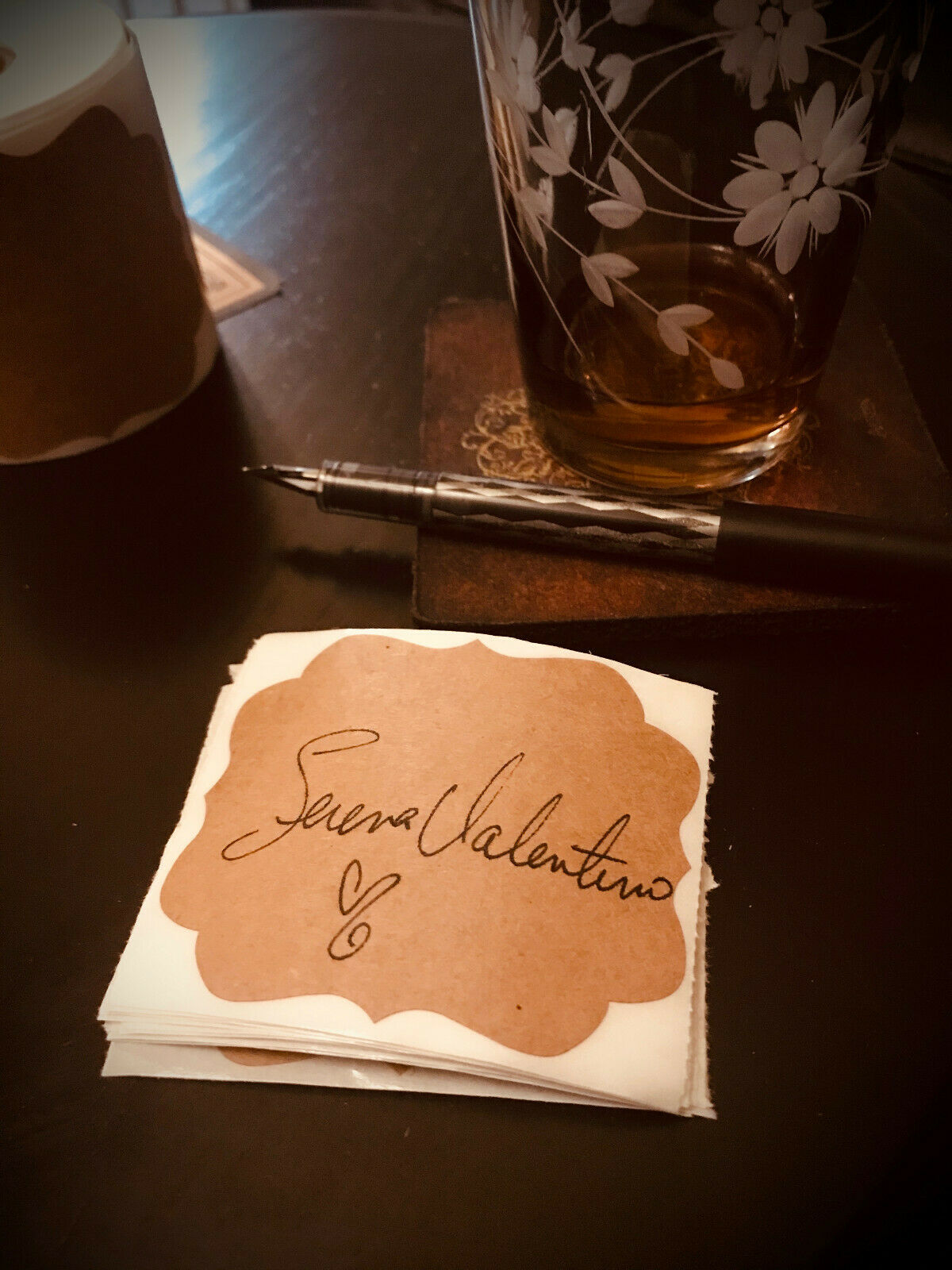-40%
1921 Autograph Famous Philadelphia Art Critic CHRISTIAN BRINTON
$ 15.83
- Description
- Size Guide
Description
120222 I AM LISTING FROM A GROUPING OF SELECTED ANTIQUE INVENTORY SOME OF WHICH HAS BEEN STORED FOR YEARS AND IS VERY FRESH TO MARKET SO PLEASE CHECK MY OTHER AUCTIONS FOR MORE GREAT ANTIQUES AND COLLECTIBLES!!!!This week's inventory comes from a large quantity of material acquired from the estate of Doris Harris, wife of celebrated autograph collector Charles Hamilton. Ms. Harris passed away in 1999 and the material being listed has been stored since then.
I WILL BE LISTING OTHER INTERESTING ANTIQUES THIS WEEK SO PLEASE CHECK MY OTHER AUCTIONS!!!
Please look at the photos to get an idea of what this is. Photos accurately reflect the condition on this item. I am not an expert, so please feel free to ask any questions, and I will answer them the best way I can. I may not be able to answer your questions immediately, but every question will be answered. Please try to ask questions before the last day of the auction because I am not always around to answer them then. I will combine packing and shipping on items purchased within 24 hours of each other.
International buyers: I will only ship via USPS priority mail due to too many mishaps. I will also not falsify any customs documents so please do not ask. Realistic reserve set just to protect my investment, if there is a reserve at all. I am not interested in selling off of Ebay so please do not ask. Payment must be received within three days of close of auction. California residents must add 8.75% sales tax to their purchase unless they hold a valid California resale permit. If you do have a permit, please include it when sending your payment so that I can have it on file. All packages shipped with insurance, no exceptions. All items sold as-is unless I misrepresent something. Good luck and thanks for looking!!!
This Auction consists of a VERY RARE Letter from famous Philadelphia Art Critic Christian Brinton. This letter is hand signed and written, dated May 11th, 1921 and is written on a folded 8 1/2" x 11" paper.
Christian Brinton lived in Chester County, Pennsylvania. Their meeting in the late 1930s marked a turning point in Pippin’s artistic career.
Brinton, an art critic, curator, and collector, became one of Pippin’s most important and influential supporters. His promotion of Pippin’s work in the local press and exhibitions helped the artist gain national recognition.
Art critic, curator and collector Christian Brinton (1870-1942) championed the art of his day, promoting works from geographic areas and artists often outside the traditional western European schools. In one of his earliest published writings, "Modern artists, by Christian Brinton" (1908), the author included artists as diverse as Belgians Antoine Wiertz and Constantin Meunier, Russian Il'ya Repin, the American Gari Melchers as well as expatriates James McNeill Whistler and John Singer Sargent and the 18th -century French painter Jean-Honoré Fragonard. Perhaps Brinton intended this diversity as evidence of his notion of "evolution, not revolution in art," which emphasized a gradual transformation from Impressionism through post-Impressionism. Brinton contributed to a number of exhibition catalogues, including those featuring the works of Prince Paul Troubetzkoy (1911 and 1916), Ignacio Zuloaga (1916), Boris Anisfeld (1918) and Cesáero Bernaldo de Quirós, (1932), as well as art from the 1915 Panama-Pacific International Exposition (1916), war paintings and drawings by British artists (1919), and contemporary Scandinavian, Belgian and Russian art (held respectively 1912, 1929, and1934). The Philadelphia Museum of Art co-sponsored the latter exhibition, and in 1941 Brinton gifted to PMA his collection of contemporary European art, which consisted primarily of Russian objects, and included paintings, sculpture, prints and drawings, costumes and textiles, and crafts and toys. His gift also included more than 1,200 reference books. Brinton also collected paintings by the African-American folk artist Horace Pippin. Like Brinton, Pippin was born and resided in West Chester, Pennsylvania, located about 25 miles west of Philadelphia. His portrait of Brinton ("A Chester County Art Critic") was part of the 1941 gift to PMA. Along with N.C. Wyeth and William Palmer Lear, Brinton co-founded the Chester County Art Association in 1931. He was married briefly to the artist Caroline Peart Brinton, also a native of Pennsylvania.
A self-taught artist recognized for his portraits and traditional Spanish scenes such as bullfighting, IGNACIO ZULOAGA was born in 1870 in Eibar, part of the Spanish Basque country. Although his father planned for Zuloaga to study engineering (and then when that failed, architecture), those plans were dashed with the son's first chance visit to Madrid. According to a 1916 article that Christian Brinton wrote for Vanity Fair, during that visit, Zuloaga came "under the spell of the restrained, aristocratic vision of el Greco and Velázques, and the restless vitality of Francisco de Goya." As a result, a "feverish exaltation appeared to take possession of the young man's soul." In terms less flowery, other scholars also have seen the influence of these artists, as well as John Singer Sargent, in Zuloaga's works. Zuloaga lived for a time in Rome and Paris, where he became friends with Lautrec, Degas and Gauguin. He then went to London, before returning to Spain, where he was hailed as the "regenerator of Spanish national art." As described by Brinton, Zuloaga's paintings typify the "somber Gothic" Spanish style, conveying an "austerity and a rigorous sense of reality." In the fall of 1924, he traveled to America where members of high-society welcomed him and American women, including Mrs. William Randolph Hearst, happily posed in Spanish costumes as he painted their portraits. Zuloaga died in 1945.
Best-known as a portrait sculptor, PRINCE PAUL TROUBETZKOY was twice the subject of Christian Brinton. In the catalogue to the 1916 exhibition of the artist at the Detroit Museum of Art, Brinton praised his sculpture for what it did not include, namely the "conventional nude" and "that vacuous symbolism so dear to those who are too cowardly or too incompetent to face the facts of everyday existence and extract whatever measure of beauty may reside therein." Born in 1866 to a Russian nobleman and the American Ada Winans, Troubetzkoy grew up in the Lago Maggiore area of Italy. According to Brinton, Troubetzkoy's talents surfaced at an early age when the Milanese sculptor Grandi declared the horse's head the boy modeled from wax as "youthful genius." By 1887, he was exhibiting in Italy, France and the United States. The following year he moved to Russia and remained there until 1906. He visited Leo Tolstoy at his estate, making many drawings and busts of the famed Russian author. Other well-known figures Troubetzkoy depicted include George Bernard Shaw, the dancer Pavlova and a young Franklin Delano Roosevelt. He also designed an equestrian monument of Emperor Alexander III. Troubetzkoy died in 1938.










